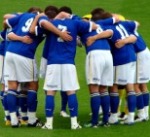It is well documented that competition can affect performance and emotion in sport. However, our understanding of the comparative effects of individual and team competitions on performance and emotion is limited.
We also know little about emotion-based mechanisms underlying the effects of different types of competition on performance.
A study involved 64 participants completing a handgrip endurance task during time-trial, one-on-one, two-on-two and four-on-four competitions while self-report and possible corroborative physiological measures of enjoyment, anxiety and effort were assessed.
Results indicated that performance, enjoyment, anxiety and effort were greater in team competitions than in individual events. It was also concluded that the observed increases in performance were mediated by increased enjoyment and effort.
Read the published findings here. Or an article on it here, or read on.
By Michelle Hamilton, RunnersWorld
Science provides plenty of evidence that we perform better in competition than out—a quick glance at your race versus training times likely offers all the proof you need. But what about different types of competition? Are we at our best when we’re fighting for a spot on a leaderboard, or when others are counting on us? A new study out of the U.K. put that question to the test, evaluating the effect of individual and team competition on performance.
Sixty-four participants in their early 20s competed in a handgrip contest. Previous studies had shown that feelings influenced the results of similar endurance-based motor tasks, and since the researchers were also interested in how emotions influenced the competition-performance equation, they adopted the test.
Each subject competed in a total of four competitions. In the first two events—a time trial and one-on-one match-up—subjects played as individuals. In the other two contests—two-on-two and four-on-four—they competed as a team. Subjects were divided into groups of eight. To control for the potential influence of an audience (i.e., fans), each test was held in an open laboratory where study subjects and scientists were all present and visible to each other.
Participants reported their enjoyment, anxiety and effort level via a survey. Researchers also gathered data on heart rate and other physiological indictors associated with emotion. Force output and muscle activity were also measured.
As expected, the study found that performance improved as interaction with others increased. That is, participants pushed themselves harder during one-on-one competition than they did during the time trial. And they were able to hold the handgrip longer (an average of 13 seconds) when competing as a team, providing more evidence that “team competition can promote better performance than individual competition in sport,” the researchers wrote.
But the effect tapered off. Participants performed at the same level as part of a four-member team as they did during the two-on-two test. The authors say this suggests that larger groups might negate the team effect due to “social loafing”—we’re more likely to slack off in big groups than small ones.
Emotions came into play across all competitions. Reports of greater enjoyment followed the same pattern as improved performance; it increased from time trial to one-on-one to team events. Yet anxiety also rose. Competitors were more nervous during one-on-one competition than during the time trial, perhaps due to greater opportunity for comparison. Feelings of responsibility toward teammates were likely part of the cause for the anxiety spike noted during team competitions, the researchers noted.
But rather than countering one another, increased enjoyment and anxiety combined to rally participants. The physiological data—output force, muscle activity— substantiated their findings; all were similar during each competition. This means that observed changes in cardiovascular activity could have been driven by emotion rather than effort.
For runners looking for faster times, the evidence in this study suggests that the path to a personal best might be best achieved while you’re simultaneously earning points for a racing team. Road relays are increasingly popular, and an excellent way to add team spirit to what’s usually a solo sport.

Pretty! This has been an incredibly wonderful article.
Thanks for supplying this information.